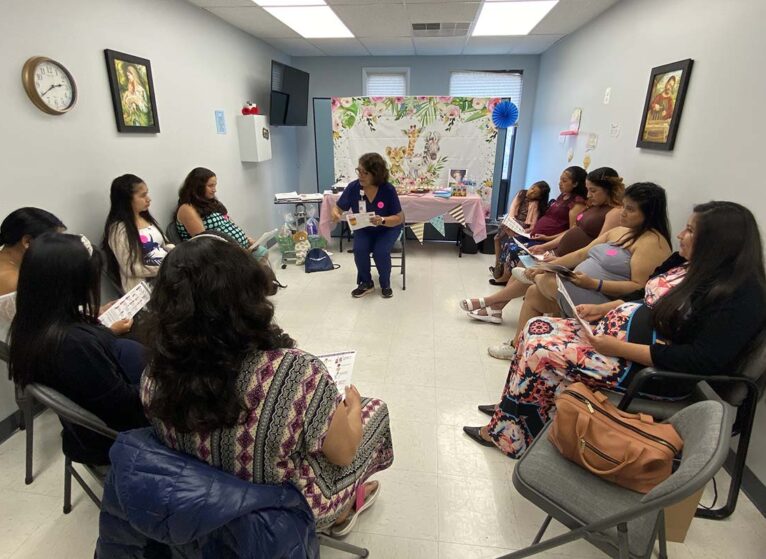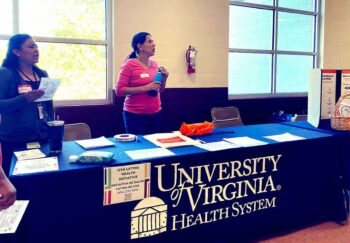It’s National Hispanic Heritage Month. At UVA Health, this month comes with a call to action: do our part to reduce the health disparities Latino communities face. With October being Breast Cancer Awareness month, we wondered: Do Latina women face specific health challenges? If so, does UVA Health offer programs geared to address these issues?
The answer to both questions, we discovered, is yes. We talked to three doctors who are leading the way in providing Latina women with access and care in key areas of pregnancy, heart disease, and cancer.
Pregnancy & Birth: Supporting Hispanic Mothers
Latino infants are at higher risk for negative fetal and neonatal health outcomes, including infant mortality. Compared to non-Hispanic white women, the percentage of preterm births for Mexican, Central and South American, Cuban, and Puerto Rican women is 3-26% higher, according to the CDC.
Paola Gehrig, MD, herself of Hispanic origin, is intimately familiar with these disparities. She leads the OB-GYN department at UVA Health.
When it comes to barriers during pregnancy, Gehrig says many Hispanic women lack trust in doctors due to a lifetime of inadequate access and care.
Looking for Culturally Competent Care?
Check out the UVA Latino Health Initiative.
Which is why outreach programs specifically targeted to and welcoming Hispanic mothers have the potential to earn back some of that trust. UVA Health Prince William Medical Center, for example, offers a special program for new mothers on a regular basis. This educational event, delivered in Spanish, orients expecting parents to car seat safety, sleep safety, and other newborn tricks and tips. Participants also walk away with donated items to ensure they leave the hospital with what they need.
At UVA Health, special events don’t replace the daily aim of empathy and engagement. To Gehrig, providing culturally competent care requires a consistent effort. “We have to do our very best, every time, every day, to include and engage our patients in their healthcare decisions and choices.”
Addressing Latino Women’s Heart Risks
"There are specific reasons why heart disease screenings are particularly important for Latino women,” says UVA Health cardiologist Patricia Rodriguez Lozano, MD. “Latinx women are at a higher risk of certain traditional, well-established risk factors for heart disease, including obesity and diabetes. Regular screenings are crucial to identifying and managing these risk factors early.”
UVA Health offers three clinics for women’s heart healthcare through a special program for women. “Cardiovascular disease affects women differently than men, and there are sex-specific risk factors that are important to consider, especially for Latino women,” Rodriguez Lozano explains.
This is partly because of hormonal changes women have throughout their lives from taking birth control, pregnancy, and menopause. Other risk factors that commonly affect women include polycystic ovary syndrome (PCOS), gestational diabetes, hypertensive disorders during pregnancy, depression, anxiety, and socioeconomic factors.
“Latina women have a higher prevalence of PCOS and gestational diabetes,” Rodriguez Lozano notes. “Latina women may also be at a higher risk of experiencing depression and anxiety, which can contribute to heart disease risk.”
How does the program support Latina women? “Our providers and staff involved in the program are culturally competent and can effectively communicate with Latino women, including those with limited English proficiency,” Rodriguez Lozano explains. “All program materials forms are available in both Spanish and English. We offer interpreter services or bilingual staff to assist with communication.”
Tackling the Cancer That Kills the Most Hispanic Women
Breast cancer is the most common cancer and causes the most cancer deaths in Latina women. And cervical cancer is the third most common cancer among Latina women, UVA Health cardiologist Max Luna, MD, says.
In the Latino community, both cancers are “detected at a more advanced stage than in other racial or ethnic group due to limited access to healthcare and lower health literacy,” he explains.
To combat this barrier to care, UVA Health offers the Every Woman’s Life Program, which provides free breast and cervical cancer screenings for low-income women. “UVA Cancer Center has a very experienced, language and cultural competent team offering this very valuable service,” Luna shares.
Luna also orchestrates Latino community health events featuring free screenings for breast cancer and a range of other issues.


